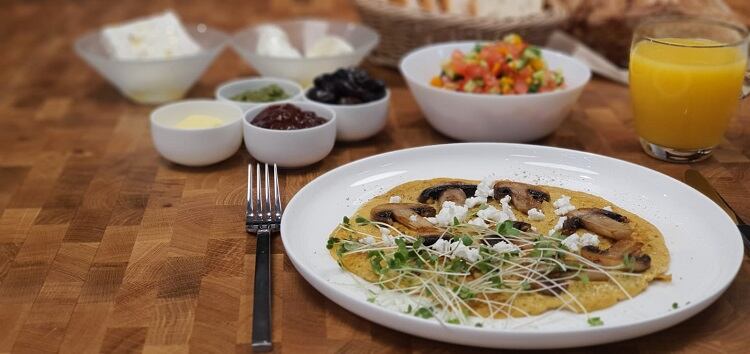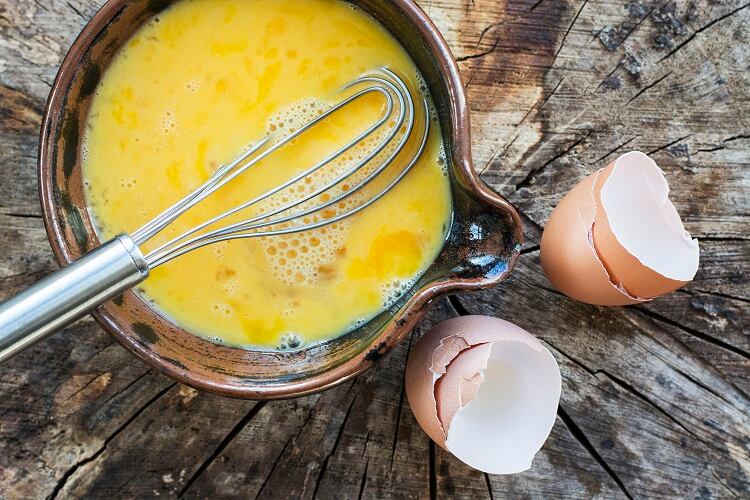A subsidiary of SavorEat, Egg’n’up has much the same agenda. The start-up is on a mission to create a protein alternative that mimics that produced by animals.
Whereas SavorEat – an automated, closed system that 3D prints and cooks plant-based meat alternatives for foodservice – aims to reduce global meat consumption, Egg’n’up, as the name suggests, is targeting eggs.
Consumers may wish to avoid eggs for several reasons, explained founder and SavorEat CEO Racheli Vizman. While some may be turned off egg consumption for environmental and animal welfare reasons, others have health front-of-mind. “Some people are allergic to eggs, or can’t consume them for medical reasons, due to their cholesterol content.”
Egg’n’up’s solution is to replace eggs used as ingredients in food formulation. While other businesses are also looking to disrupt the B2B egg ingredient space – Israeli start-up Zero Egg and Switzerland-based EggField come to mind – Vizman said its proprietary technology helps set Egg’n’up apart.
Taste (and texture) is king
The ‘biggest thing’ when developing a food product is taste. “Taste is king,” the SavorEat CEO reiterated. “It must be really tasty, so that people make the switch from the real thing to the alternative.”
For Egg’n’up, taste and texture go hand in hand. “If you want taste, part of that taste is texture,” we were told. In other words, achieving the right flavours and colours to mimic animal products is not enough ‘if the texture is not there’.
To achieve texture, the start-up is leveraging the same proprietary plant-based technology used by SavorEat: a derivative of cellulose found in plant cell walls. The ingredient, which acts as a binding agent, was developed by researchers at the Hebrew University of Jerusalem. “It allows us to make a very stable dish,” the founder told this publication.
According to Egg’n’up, the cellulose derivative’s ‘biggest advantage’ is that it can help ‘create better texture’ that ‘mimics the experience of eating real egg’. As cellulose has no colour or flavour, the start-up relies on other ‘plant-based ingredients and expertise’ to round out the solution.
These unique ingredients are produced at SavorEat’s manufacturing facility in Israel.

Mimicking the functionality of egg
Of course, when replacing egg as an ingredient, functionality is also key. In food formulation, egg can help gelate, foam, bind, and emulsify. Egg’n’up wants to emulate these properties, but with plants.
“Egg is not just as it is in an omelette. You can use it for other purposes, such as in the bakery industry,” she continued, emphasising the start-up’s initial B2B objectives.
Egg’n’up has developed an omelette as a proof of concept, but expects to have developed a variety of B2B ingredients – which could include egg white, whole egg, and egg yolk replacements – within the next six months. The start-up is collaborating with industry to get there.
“We are now working on what will be the first product, but we have a few ideas…that we will work on in parallel. At the end, we will introduce a whole solution for different applications. That is the goal.”
Down the line, Vizman plans to extend offerings into the consumer market.
‘Cleaner’ ingredients lists, without the methylcellulose
By leveraging SavorEat’s plant cellulose derivative, Egg’n’up will be able to help food manufacturers ‘clean up’ food labels, we were told.
“We can reduce the list of ingredients and make ingredients cleaner. This unique cellulose is clean label, there is no E-number. So we can use it and either reduce or eliminate methylcellulose [in finished products.]
Methylcellulose is an emulsifier, stabiliser and thickening agent. It is created from cellulose – a natural substance found in plant cells – by heating it with a caustic solution and treatment with methyl chloride. The resulting odourless ingredient is one of the most common thickening agents used to bind plant-based ingredients in meat analogues.
“One of the challenges industry is facing is how they can reduce methylcellulose,” explained Vizman. Not because it is necessarily unhealthy, but because it has a consumer-unfriendly name and has attracted ‘very bad publicity’.
“One of our goals is to reduce or even to eliminate methylcellulose, so you don’t need to put it on the label.”

Moving forward, Vizman does not expect any significant regulatory challenges. “We are not using new ingredients that no one has consumed before. We are using sources that have already been approved for use in food.”
While still looking for strategic investors, the start-up is preparing to close a $2.5m seed round, which will ‘take Egg’n’up up until commercialisation’.





